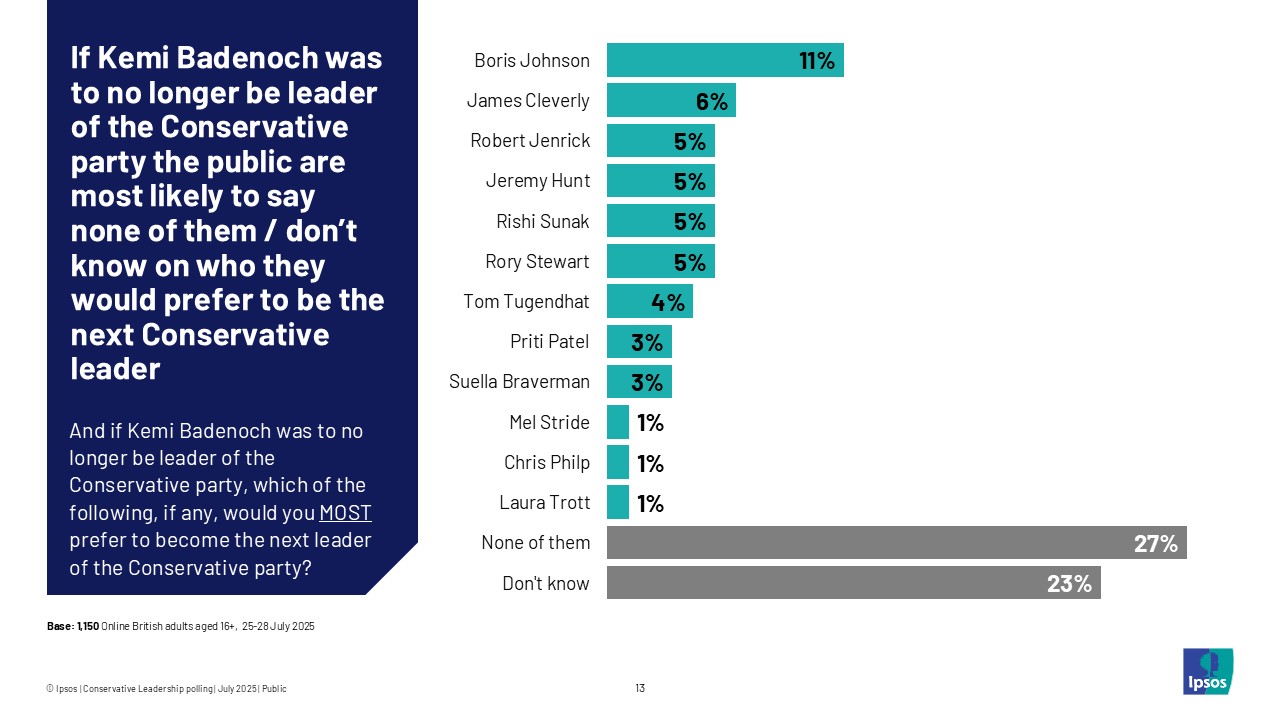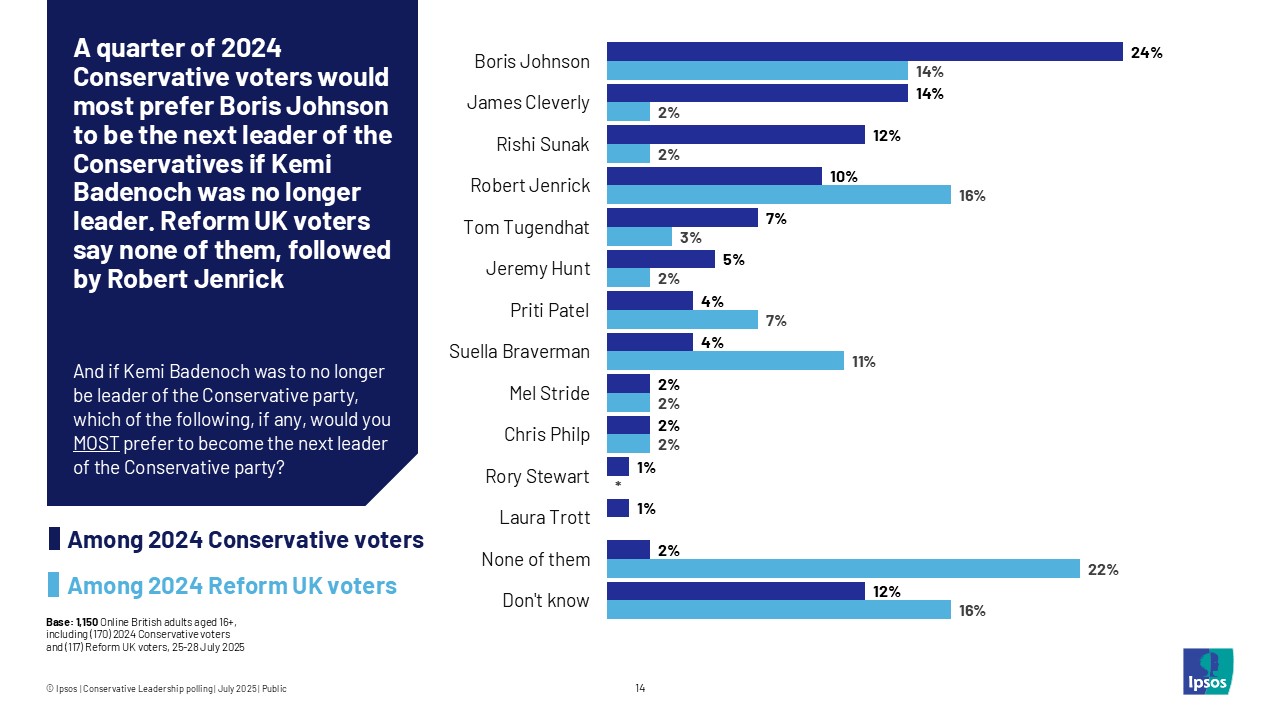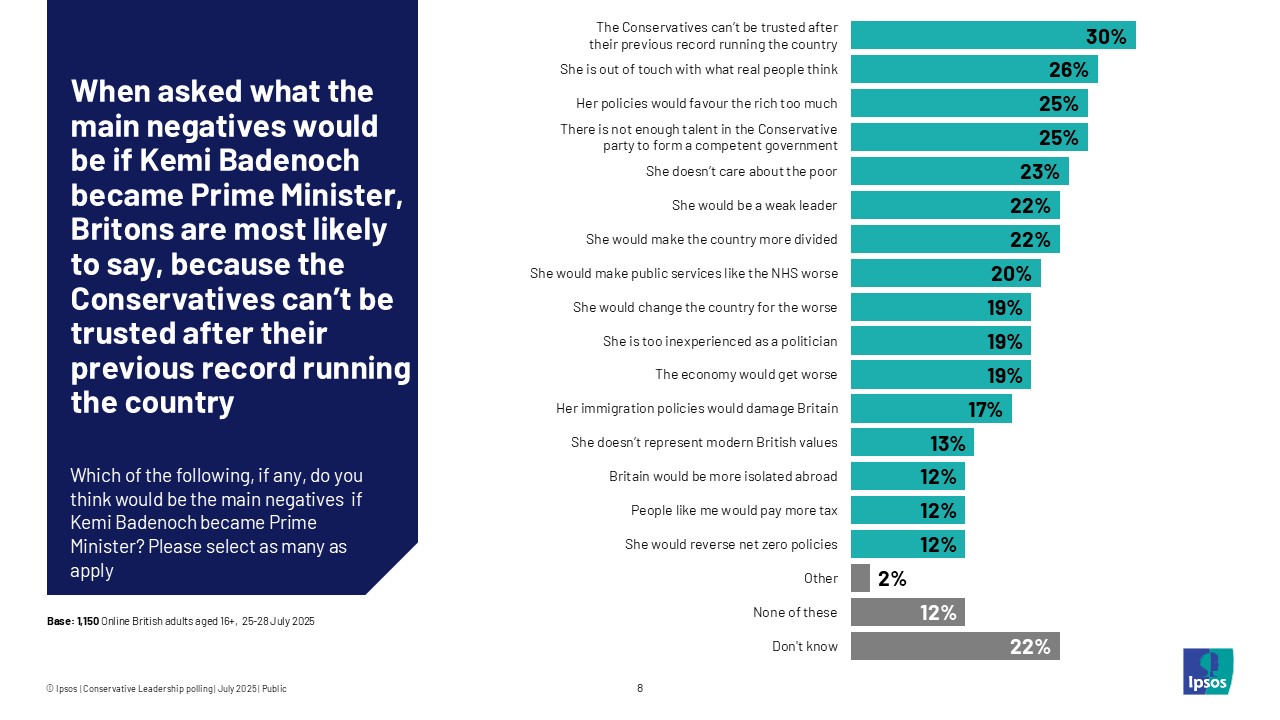Cameron Garrett is Associate Director of UK Politics at Ipsos.
It doesn’t take a pollster to see that the Conservative Party is in trouble. They haven’t just failed to recover from their historic defeat at last year’s general election – they’re going backwards.
Not too long ago it would’ve been unthinkable for the world’s most successful political party to be bumping along at sub-20 per cent of the vote share; now, it’s so common place, it’s barely even commented on.
Their low polling numbers could be partially caused by a seeming lack of relevance. In July, Ipsos polling suggested that half (49 per cent) of the public didn’t recall seeing or hearing from a member of the shadow cabinet over the previous couple of weeks. On the major issues of the day, often the Conservatives are nowhere to be found.
Kemi Badenoch receives the most blame for this situation – and with good reason. She appears to have very little ‘cut through’ with the wider public and what little they know of her, they don’t like. Ipsos’ July Political Pulse tracker found just 17 per cent of the public have a favourable view of her, the lowest of any major party leader.
It is little wonder then that just a third of Britons think it’s likely she will be leader of the Conservative Party by the time of the next general election. Based on the ever-increasing number of briefings from party insiders, there is even a risk that Badenoch is removed as leader by Christmas.
But this then leads us to the two questions that should be asked by Badenoch’s detractors. Firstly, could someone else do any better? And is Badenoch really the fundamental problem?
Ipsos in the UK’s new polling, shared exclusively with ConservativeHome, attempts to answer these questions. Unfortunately, for the Conservative Party, there doesn’t seem to be easy solutions.
When the public is asked to pick from a list of prominent Conservative politicians who they would back as the next leader of the party there’s two clear winners: “none of them” (27 per cent) and “don’t know” (23 per cent) garnering the support of half. Very few have an opinion on actual contenders. Boris Johnson (11 per cent) leads the pack, followed by James Cleverly (six per cent), and then Robert Jenrick, Jeremy Hunt, Rishi Sunak, and Rory Stewart, all on five per cent.

Among Conservative voters, Johnson (24 per cent) is more of a clear winner, ahead of Cleverly (14 per cent), Sunak (12 per cent) and Jenrick (10 per cent). It’s worth noting that Jenrick (16 per cent) and Johnson (14 per cent) essentially tie among 2024 Reform voters, though “none of them” (22 per cent) comes out on top.

In short, among the most popular alternatives for Conservative leader, many of them are intimately tied to previous administrations; Johnson was literally in charge of one of them. There’s also the second problem that many of them aren’t currently sitting MPs.
That’s a huge issue, because the data points toward the conclusion that the biggest problem for the Conservatives right now isn’t any one leader. It’s the Tory brand, weighed down in the public’s eyes by 14 years of their record.
For instance, when asked what the main negatives would be if Badenoch became prime minister, Britons are most likely to say the Conservatives can’t be trusted after their previous record running the country. That isn’t something that will be solved by a Johnson comeback.

Ipsos also records the public’s favourability towards political parties. Reform UK is the most popular with a third saying they have a favourable view of the party (32 per cent); meanwhile the Conservatives have the lowest, with just one in five (21 per cent) remaining positive about them. In other words, it’s not Badenoch dragging the party down: the Conservative Party is holding her back too.
That suggests something more fundamental is needed. Removing Badenoch as leader isn’t likely to solve anything, unless it means the Conservative Party delivers a clear-eyed assessment of what it is and for whom it stands.
This isn’t about a new face, but a new foundation. Our polling consistently shows that the top issues for voters are immigration, the economy, and the NHS. The path back to relevance doesn’t lie in fighting culture war battles that, while prominent in the media, are not the top-of-mind concerns for most Britons.
Instead, the party must rediscover a compelling and authentic narrative on the core issues. This could mean a return to a disciplined focus on fiscal conservatism and a smaller state, but crucially, this must be framed in a way that addresses modern anxieties, particularly around the cost of living.
The challenge, therefore, is to build a new brand identity: one that moves beyond the legacy of the last decade and offers a credible, forward-looking vision for the country that resonates not just with the party faithful, but with the public and its priorities.





![Gavin Newsom Threatens to 'Punch These Sons of B*thces in the Mouth' [WATCH]](https://www.right2024.com/wp-content/uploads/2025/08/Gavin-Newsom-Threatens-to-Punch-These-Sons-of-Bthces-in-350x250.jpg)
![ICE Arrests Illegal Alien Influencer During Her Livestream in Los Angeles: ‘You Bet We Did’ [WATCH]](https://www.right2024.com/wp-content/uploads/2025/08/ICE-Arrests-Illegal-Alien-Influencer-During-Her-Livestream-in-Los-350x250.jpg)







